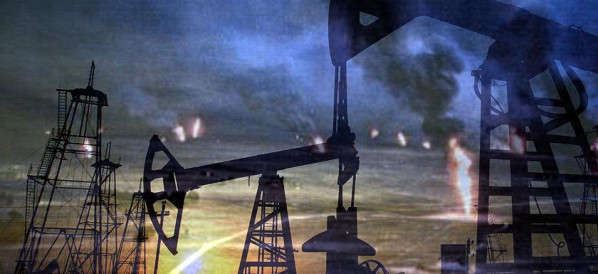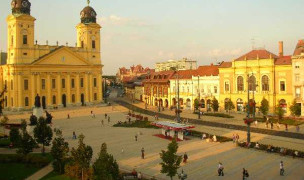 15 Terms
15 TermsHome > Terms > English (EN) > Bosnia and Kosovo
Bosnia and Kosovo
During the second half of the 1980s, Yugoslavia’s ethnically and religiously diverse republics—Slovenia, Croatia, Bosnia-Herzegovina and Macedonia—started to push for greater autonomy In response, Yugoslav President Slobodan Milosevic, an avowed Serbian nationalist, endeavored to consolidate the position of Serbia in various ways.
Slovenians and the Croatians declared their independence. Forced to accept Slovenian independence, since almost no Serbs lived in that province, Milosevic went to war with the Croatians. The Bush administration remained onlookers (hoping that Yugoslavia would not break up into small provinces and not wanting involvement in another war so soon after the Gulf War) until news reports of “ethnic cleansing” prompted government officials to push for peace negotiations. The Clinton administration followed a more active policy favorable to the Muslims. Following accords between the disputing provinces, the United Nations sent in peacekeeping forces to Croatia.
The Serbs then turned their attention to Bosnia, with a multi-ethnic, generally harmonious population centered in the historically cosmopolitan capital, Sarajevo. Bosnia was now painted by Milosevic as a province marked by centuries of ethnic strife, with a Christian Serb minority at the mercy of the Muslims. Serbs bombarded Sarajevo, which had received no peacekeepers and which, with the international arms embargo on the region, was essentially defenseless. During this conflict (1992–5), the leader of the Bosnian Serbs, Radovan Karadzic, is alleged by the War Crimes Tribunal in The Hague to have established concentration camps and to have sanctioned torture, rape and massacres. As many as 200,000 Bosnian Muslims, Croats and Serbs may have been killed in this genocidal civil war.
The intervention of the United States, and the diplomacy of Richard Holbrooke, helped bring about the Dayton Agreement in November 1995, which partitioned Bosnia. The establishment of a NATO mission in the country brought peace, but the settlement’s partition appeared to validate some of the Serbs’ territorial demands and strengthened Milosevic’s position in Yugoslavia, leading him to respond in a similar way to Kosovar nationalists as he had done to the Bosnians. Milosovic’s refusal to recognize independence for Kosovo was followed by a Yugoslav onslaught on Albanian Kosovar forces in 1999, allegations of renewed genocidal activity and NATO military intervention (including the presence of US troops) that established greater independence for the province.
- Part of Speech: noun
- Synonym(s):
- Blossary:
- Industry/Domain: Culture
- Category: American culture
- Company: Routledge
- Product:
- Acronym-Abbreviation:
Other Languages:
Member comments
Terms in the News
Billy Morgan
Sports; Snowboarding
The British snowboarder Billy Morgan has landed the sport’s first ever 1800 quadruple cork. The rider, who represented Great Britain in the 2014 Winter Olympics in Sochi, was in Livigno, Italy, when he achieved the man-oeuvre. It involves flipping four times, while body also spins with five complete rotations on a sideways or downward-facing axis. The trick ...
Marzieh Afkham
Broadcasting & receiving; News
Marzieh Afkham, who is the country’s first foreign ministry spokeswoman, will head a mission in east Asia, the state news agency reported. It is not clear to which country she will be posted as her appointment has yet to be announced officially. Afkham will only be the second female ambassador Iran has had. Under the last shah’s rule, Mehrangiz Dolatshahi, a ...
Weekly Packet
Language; Online services; Slang; Internet
Weekly Packet or "Paquete Semanal" as it is known in Cuba is a term used by Cubans to describe the information that is gathered from the internet outside of Cuba and saved onto hard drives to be transported into Cuba itself. Weekly Packets are then sold to Cuban's without internet access, allowing them to obtain information just days - and sometimes hours - after it ...
Asian Infrastructure Investment Bank (AIIB)
Banking; Investment banking
The Asian Infrastructure Investment Bank (AIIB) is an international financial institution established to address the need in Asia for infrastructure development. According to the Asian Development Bank, Asia needs $800 billion each year for roads, ports, power plants or other infrastructure projects before 2020. Originally proposed by China in 2013, a signing ...
Spartan
Online services; Internet
Spartan is the codename given to the new Microsoft Windows 10 browser that will replace Microsoft Windows Internet Explorer. The new browser will be built from the ground up and disregard any code from the IE platform. It has a new rendering engine that is built to be compatible with how the web is written today. The name Spartan is named after the ...
Featured Terms
Oil War of 2014
The Oil War of 2014 was a global competition for oil market share between traditional oil producing countries led by the OPEC and the surging US shale ...
Contributor
Featured blossaries
Browers Terms By Category
- General architecture(562)
- Bridges(147)
- Castles(114)
- Landscape design(94)
- Architecture contemporaine(73)
- Skyscrapers(32)
Architecture(1050) Terms
- Economics(2399)
- International economics(1257)
- International trade(355)
- Forex(77)
- Ecommerce(21)
- Economic standardization(2)
Economy(4111) Terms
- Radiology equipment(1356)
- OBGYN equipment(397)
- Cardiac supplies(297)
- Clinical trials(199)
- Ultrasonic & optical equipment(61)
- Physical therapy equipment(42)
Medical devices(2427) Terms
- SAT vocabulary(5103)
- Colleges & universities(425)
- Teaching(386)
- General education(351)
- Higher education(285)
- Knowledge(126)





